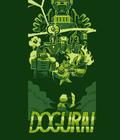Dogs have been humans' best friends since the dawn of time, and for good reason. We complement each other; they smell well and run quickly, and we have more highly developed brains. It's a win-win! We've even given jobs to dogs, from aiding those with impairments to herding sheep and even saving artwork. Finding limits and breaking them is what humanity does best, and tasking our best friends with taking up arms may be more realistic than we think. Until they develop opposable thumbs, we will have to be placated by QuByte's Dogurai, where — you guessed it — you play as a dog who's a samurai, from rocking a bright white kimono to thrusting its kimono at anyone who crosses its path. Rocking 8-bit from head to toe, Dogurai strives to bring the player back to the good ol' days with of all the era's strengths and weaknesses in tow.
From the get-go, Dogurai bleeds simplicity. The main menu boasts sturdy, blocky text (play, options, credits) accompanied by an arrow and the game's logo, while a husky (pun intended) chiptune chugs in the background. Opting to play gives you the choice of playing at your leisure or at the game's, either playing with numbered lives and continues or with reckless abandon. The game doesn't spare any pixels on anything remotely related to a plot and throws you into the thick of it. In nostalgic perfection, your heroic eponym explodes through a building and gets to slicing. Armed with its razor-sharp sword, the dogurai brings to bits anything that stands in its way, from the meager mooks that block your path to the bullets they fire.
The city burns in the background as you slash, slide, and leap your way through skyscrapers and sewer systems, incredibly akin to a Zero playthrough of one of the Mega Man X games. Jobbers melt before your blade like a soccer player itching for a red card, if you even deign to kill them. They are as useless in life as they are in death, as jumping around the majority of them is preferable, since defeating them provides no benefits to your progress. The opportunity cost of grappling with foes is rather high, especially when the game sticks to its 8-bit guns a little too closely with lagging input readings.
Regardless of whether your slice-up pup ends up being (mostly) a pacifist, you can't finish this or any other level without defeating the boss. While brute-forcing your way through the bosses is a possibility, it's enough to look for a lapse in your enemy's defenses, as denoted by their exasperated "!" speech bubble. You're then thrust into a difficult quick time event (QTE) sequence, allowing you a flurry of slashes upon your opponent. However, unlike the Mega Man games, you do not inherit your froggy foe's shurikens in their death — a shame for us all.
As you progress to your next level of choice, the color palette transitions to fit the destination: a dusty ochre for the desert, piercing crimson in the volcano, and blinding ultramarine in the tundra. This specific case of creativity is clever, like a magician using sleight of hand; the color swaps from level to level cover the recycling of enemy and background models. While this spices up the visuals, it begs the question: Why was this needed? Did the game need to be under 150 MB for some reason?
The aesthetics are formidable. The pixel chunk is charming, but the settings are rather blasé given the nonexistent world-building, which is necessary when the game limits itself so heavily. We've seen it work before: Mario games had you save the princess, Castlevania had you defeat Dracula, etc. You could fill in the blanks of the situation with your imagination, but with nothing to base your experience on, Dogurai's visual faults stand out even more. Even with the color swaps, things start to blend together since the different stages feel like plug-and-chug level design. The familiarity of the visuals, from background to bosses, shirks charm for boredom, especially when paired with repetitive gameplay mechanics and music.
Speaking of which, the chugging chiptune melodies in the background are incredibly memorable. Dogurai embraces the fact that it could have been an idea thought up by Wyld Stallyns themselves, and it features music that would best be described as radical. Melodramatic melodies jump through pieces while busy rhythms play in the background. These vivacious loops are key to keeping the player's intrigue while progressing through the tedious levels. Like the visuals and gameplay, the music suffers from overuse, leading to blips and crunches that becoming irritating in their endless reiteration. On a more positive note, some of the sound effects are incredibly satisfying, from your dog's double-jumps to the swoosh of its sword.
Sadly, reaching the end of Dogurai feels less like the rewarding success of a job well done and more like getting home from a long day at work. Sure, you're home now, but it would've been nicer to spend your day at home or feeling productive. The game's eight short levels can be completed in less than five hours if you search for the unrewarding secrets. This is with some padding, as one of the levels is reused and another has you fighting all of the bosses that you have fought up to that point. While the concept and some aspects of the gameplay are interesting, the game feels like a no-frills nostalgia trip for someone with little time to spare. While this could be a mindless way to pass the time, Dogurai largely falls short in engaging the player in a meaningful way.
Score: 6.0/10
More articles about Dogurai











 Dogurai is a retro-styled platformer with animal-like characters, graphics and soundtrack designed with old portable games in mind - down to the limited color ranges and sprite sizes!
Dogurai is a retro-styled platformer with animal-like characters, graphics and soundtrack designed with old portable games in mind - down to the limited color ranges and sprite sizes!

















